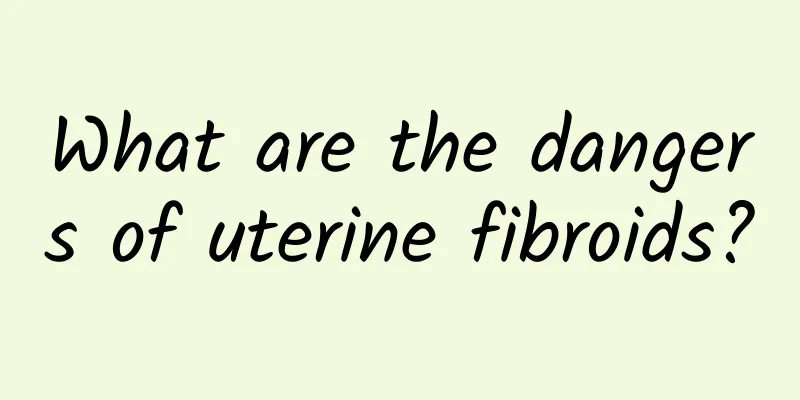What are the dangers of uterine fibroids?

|
Uterine fibroids may cause menstrual abnormalities, infertility, compression of surrounding organs, and other hazards. Severe cases require medical treatment with medication or surgery. Early detection and targeted intervention measures are key. 1. Abnormal menstruation Uterine fibroids may cause menstrual cycle disorders, such as increased menstrual flow, prolonged menstruation, or intermittent vaginal bleeding. This is because fibroids may affect the normal exfoliation of the endometrium and blood flow. If menstruation is excessive for a long time, the patient is prone to develop anemia, which manifests as pale complexion, fatigue, dizziness and other symptoms. It is recommended to pay attention to menstrual changes, take iron supplements to improve anemia if necessary, and seek medical attention in time to determine the size and location of the fibroids. 2Infertility and pregnancy related issues Uterine fibroids may affect women's fertility, especially submucosal fibroids located in the uterine cavity. It may hinder the implantation of fertilized eggs or cause pregnancy miscarriage. In addition, large fibroids may squeeze the uterus, cause cervical obstruction or uterine cavity deformation, which will also reduce the success rate of pregnancy. For people who want to have children, it is recommended to consider minimally invasive surgery such as hysteroscopy to remove fibroids to improve fertility conditions based on the doctor's evaluation. 3Compression of surrounding organs causes symptoms Larger uterine fibroids can compress surrounding organs, which may cause frequent urination, dysuria, constipation, or persistent pain in the lower abdomen. This compression symptom is particularly noticeable when the fibroids grow over a long period of time or when the uterus as a whole enlarges. Ultrasound can be used to check the size and location of the fibroids, and conservative treatment such as medication to shrink the fibroids or surgical removal such as laparoscopic surgery can be used if necessary. 4 Potential risk of malignant transformation Most uterine fibroids are benign tumors, but long-term untreated fibroids may deteriorate into sarcomas in rare cases. However, the chance of malignant transformation is less than 1%. If fibroids grow rapidly or cause irregular pain after childbirth, special attention should be paid and the patient should be promptly examined for risks. The harm of uterine fibroids cannot be ignored, but early detection and early treatment can effectively control its development. If abnormal symptoms are found, B-ultrasound screening should be performed as soon as possible, and reasonable intervention methods should be selected according to the doctor's advice. Maintaining good living habits and regular gynecological examinations are also important means to prevent related complications. |
<<: Why does dysmenorrhea cause stomach discomfort?
>>: Causes and symptoms of uterine cysts
Recommend
Sichuan style original weight loss method, first reduce belly fat with these 4 tricks and lose 5 kg!
When did you start caring so much about losing we...
What medicine should I take for uterine fibroids and adnexal cysts? How to treat uterine fibroids and adnexal cysts?
Uterine fibroids and adnexal cysts are two common...
What medicine is effective for cervicitis
The treatment of cervicitis requires comprehensiv...
Can cervical erosion heal itself?
Can cervical erosion heal itself? Recently, peopl...
Experts reveal: 5 common causes of ovulation bleeding, how many do you know?
Xiaoli is 28 years old, married recently, and is ...
Can I get vaccinated after cervical precancerous lesions turn negative?
Yes. HPV vaccine can be administered after cervic...
Causes of postmenopausal bleeding
Normally, it is a benign disease, such as cervica...
What are the symptoms of early cervical erosion? Check out 2 early symptoms of cervical erosion
Cervical erosion is a common gynecological diseas...
What are the complications of ovarian cysts?
Ovarian cysts are asymptomatic in the early stage...
What is the impact of threatened miscarriage on people?
It has become an indisputable fact that environme...
I got my period 13 days after having an abortion. What’s going on? Is it normal?
It is generally abnormal to have menstruation 13 ...
Young people are experiencing rapid graying of hair? Find out the 8 main culprits of Juvenile Whiteness! Nutritionist Lin Shihang: 8 key nutrients to get rid of "whitehead"
Why do some people start to have gray hair at the...
How to check the cause of irregular menstruation
How to check the cause of irregular menstruation?...
Eat pasta without worries! Nutritionists teach you 3 secrets to not getting fat
Whether it is a weekday dinner, a gathering with ...
How to treat uterine fibroids? What are the treatments for uterine fibroids?
Uterine fibroids are a common tumor disease in wo...









